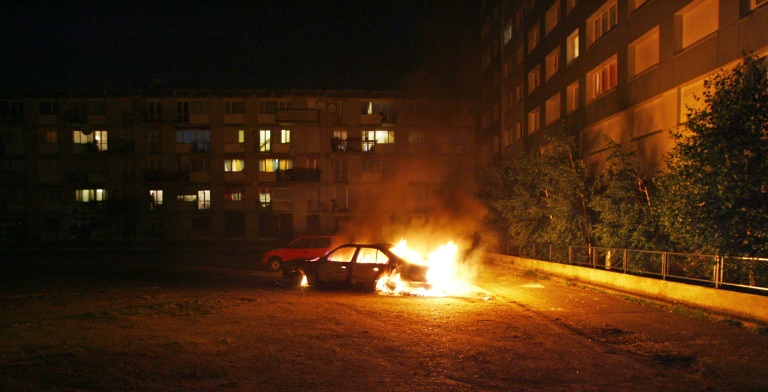JR, whose real name is Jean Rene, turned the one-year-old boy called Kikito into a 20-metre (65-foot) tall giant, who seems capable of toppling the wall and reducing US President Donald Trump’s dreams to dust.
But it is another politically-charged project closer to home which has been taking up much of the energy of the artist, often dubbed the “French Banksy” after the secretive British street artist.
JR grew up in the troubled Paris suburb of Montfermeil, where the riots which rocked France in 2005 began — the most serious social unrest the country had experienced since 1968.
“We felt it was going to explode one day but I never imagined it would be like that,” he told AFP. “There was a real tension and you didn’t have to be a great psychic to see it. People were angry and felt deliberately abandoned.”
The first stones were thrown right in front of a large photo mural JR had made of his friend Ladj Ly holding a camera as if it were a gun.
JR, then a teenage graffiti artist, had spent the previous year getting disaffected youths from the rundown tower blocks of Montfermeil and neighbouring Clichy-sous-Bois to pull faces into his lens.
He blew up the close-ups and stuck them on walls, flyposting them by night in the centre of Paris, only 15 kilometres (nine miles) as the crow flies, but a world away.
– Suburb kids seen as ‘monsters’ –

Montfermeil was the scene of rioting
“From Paris they were seen as monsters, so I got the kids to make faces so they could caricature themselves to question the way they were portrayed in the media,” he said.
He called the series his “Portrait of a Generation”, and it turned Jean Rene, the son of market stall owners, into JR the artist, whose work would go on to be celebrated from New York to Shanghai.
But to begin with, all it brought JR was trouble. Xavier Lemoine, the controversial hardline right-wing mayor of Montfermeil brought charges against him.
And tension spiralled when youngsters in the estates stopped council workers from taking the photos down — forcing JR to leave France for a year.
Earlier this year, JR was back in Montfermeil — this time as an international art star — taking mayor Lemoine’s portrait for a vast mural to mark the demolition and redevelopment of the estates.
“If you had asked me three years ago if I would ever photograph him I would have said, ‘Never!’
“He was our enemy,” JR insisted. “But when someone puts out their hand to you and apologises and asks if we can we start again…
“That made an impression because it means that things can change. It shows that people, who never talk to one another, might one day do so. It gives hope for places like the Middle East.”
JR photographed more than 750 people for the mural, a panoply of the population of Clichy-Montfermeil, from the police to former rioters and old ladies walking their dogs.
– ‘Burst bubble of tension’ –
JR Ladj Ly pose in front of a fresco of the inhabitants of the Clichy-Montfermeil
At its centre is the pained face of the brother of Bouna Traore, whose death sparked the country-wide violence in 2005 after police chased him and a friend into an electricity substation where they were electrocuted.
Despite their past reputation for being “out of control”, the artist insists the estates “are like a village”.
“Everybody knows everybody. There was a real bond,” he said.
While he was working on the mural with filmmaker Ladj Ly, who still lives on the Bosquets estate, the pair also made a series of seven short films seeking out the youngsters who featured in “Portrait of a Generation” to catch up with their stories.
“The Chronicles of Clichy Montfermeil” goes out on the streaming site Blackpills on October 9, with a shorter version to be shown later on French television.
JR is pictured near his artwork on the US-Mexico border in Tecate on September 6, 2017
“It feels like I never left,” said JR of the area. He has returned “again and again over the years” including to make a film with Ladj Ly and dancers from the New York City Ballet.
“A lot has changed. Tower blocks have come down and streets have changed but the people who took me in and trusted me have remained the same. There are still a thousand things to do.”
But JR is hopeful, “touched” even, by the attitude of his old nemesis the mayor.
“When he apologised in front of everyone there was no applause, nor was everybody hugging each other, but it burst a bubble of tension. You don’t go from enemy to hero like that, but we hope something comes of it.”
As for himself, bygones are bygones. “Maybe the mayor did me a favour by bringing charges against me,” he laughed.
Download our app and read this and other great stories on the move. Available for Android and iOS.